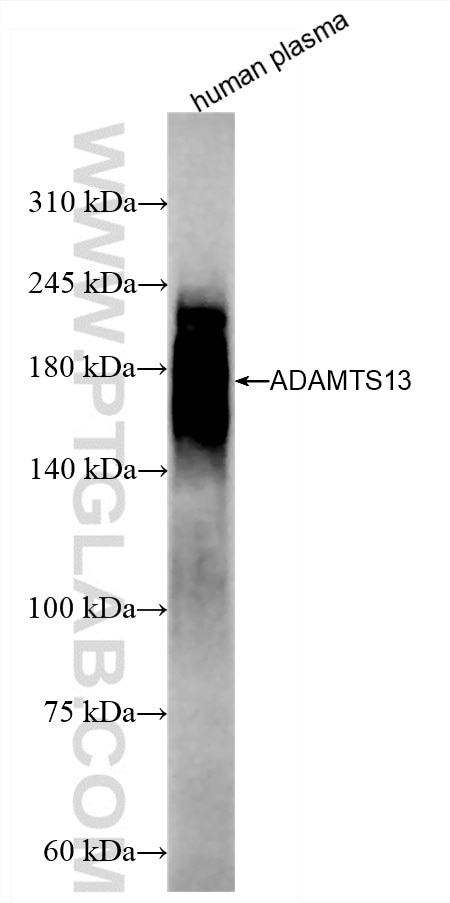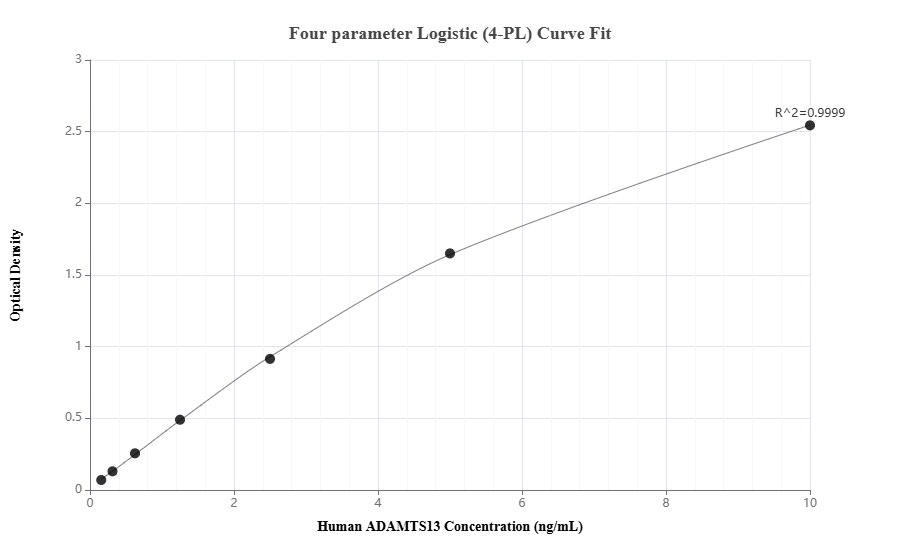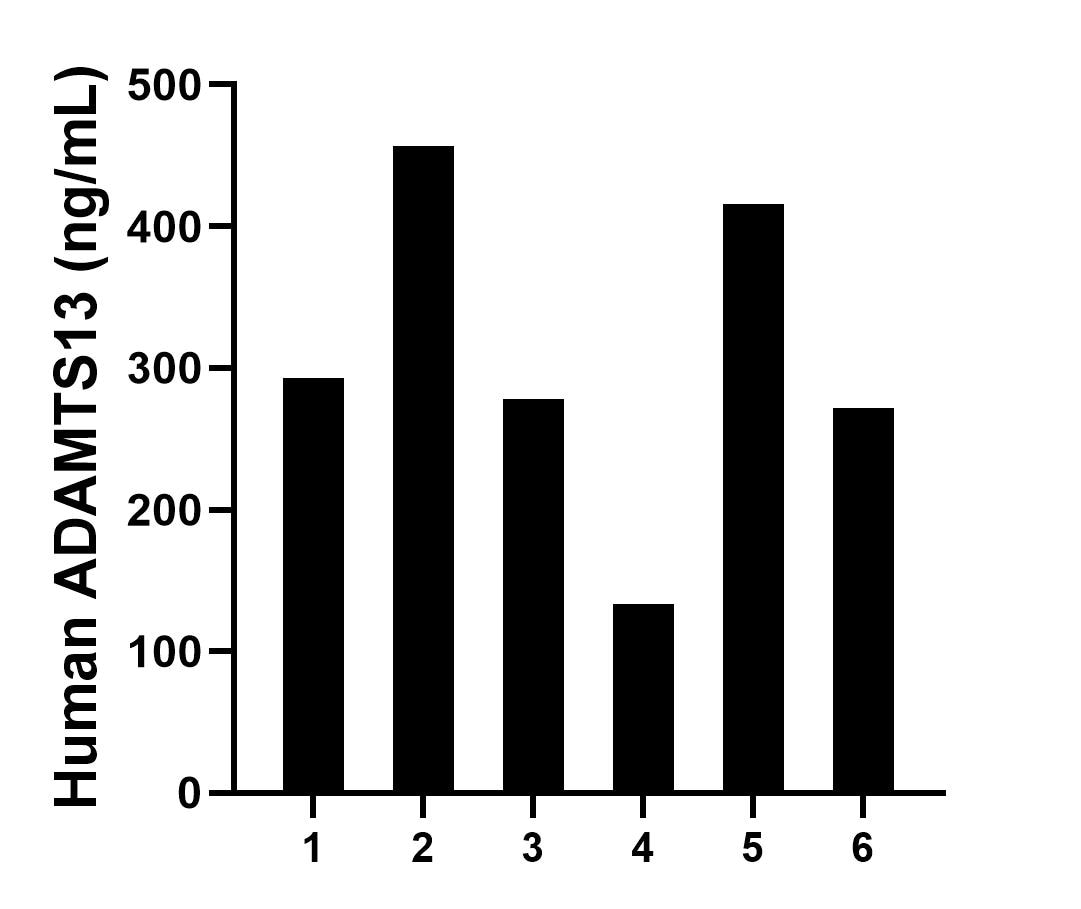Product Information
85974-3-PBS targets ADAMTS13 as part of a matched antibody pair:
MP02235-2: 85974-3-PBS capture and 85974-1-PBS detection (validated in Sandwich ELISA)
Unconjugated rabbit recombinant monoclonal antibody in PBS only (BSA and azide free) storage buffer at a concentration of 1 mg/mL, ready for conjugation. Created using Proteintech’s proprietary in-house recombinant technology. Recombinant production enables unrivalled batch-to-batch consistency, easy scale-up, and future security of supply.
This conjugation ready format makes antibodies ideal for use in many applications including: ELISAs, multiplex assays requiring matched pairs, mass cytometry, and multiplex imaging applications.Antibody use should be optimized by the end user for each application and assay.
| Tested Reactivity | human |
| Host / Isotype | Rabbit / IgG |
| Class | Recombinant |
| Type | Antibody |
| Immunogen |
CatNo: Eg2556 Product name: Recombinant Human ADAMTS13 protein (rFc Tag) Source: mammalian cells-derived, pHZ-KIsec-C-rFc Tag: C-rFc Domain: 34-688 aa of NM_139025 Sequence: QQSCLQALEPQAVSSYLSPGAPLKGRPPSPGFQRQRQRQRRAAGGILHLELLVAVGPDVFQAHQEDTERYVLTNLNIGAELLRDPSLGAQFRVHLVKMVILTEPEGAPNITANLTSSLLSVCGWSQTINPEDDTDPGHADLVLYITRFDLELPDGNRQVRGVTQLGGACSPTWSCLITEDTGFDLGVTIAHEIGHSFGLEHDGAPGSGCGPSGHVMASDGAAPRAGLAWSPCSRRQLLSLLSAGRARCVWDPPRPQPGSAGHPPDAQPGLYYSANEQCRVAFGPKAVACTFAREHLDMCQALSCHTDPLDQSSCSRLLVPLLDGTECGVEKWCSKGRCRSLVELTPIAAVHGRWSSWGPRSPCSRSCGGGVVTRRRQCNNPRPAFGGRACVGADLQAEMCNTQACEKTQLEFMSQQCARTDGQPLRSSPGGASFYHWGAAVPHSQGDALCRHMCRAIGESFIMKRGDSFLDGTRCMPSGPREDGTLSLCVSGSCRTFGCDGRMDSQQVWDRCQVCGGDNSTCSPRKGSFTAGRAREYVTFLTVTPNLTSVYIANHRPLFTHLAVRIGGRYVVAGKMSISPNTTYPSLLEDGRVEYRVALTEDRLPRLEEIRIWGPLQEDADIQVYRRYGEEYGNLTRPDITFTYFQPKPRQAWVW Predict reactive species |
| Full Name | ADAM metallopeptidase with thrombospondin type 1 motif, 13 |
| Calculated Molecular Weight | 154 kDa |
| Observed Molecular Weight | 180 kDa |
| GenBank Accession Number | NM_139025 |
| Gene Symbol | ADAMTS13 |
| Gene ID (NCBI) | 11093 |
| Conjugate | Unconjugated |
| Form | Liquid |
| Purification Method | Protein A purification |
| UNIPROT ID | Q76LX8 |
| Storage Buffer | PBS only, pH 7.3. |
| Storage Conditions | Store at -80°C. |
Background Information
ADAMTS13 (a disintegrin and metalloproteinase with thrombospondin type 1 motifs, member 13) is a zinc-dependent metalloproteinase that contains multiple domains, such as the signal peptide, propeptide, metalloproteinase domain, disintegrin-like domain, and TSP-1 domain, among others. The primary function of ADAMTS13 is to specifically cleave the ultra-large multimers of von Willebrand factor (vWF), preventing excessive platelet aggregation and the formation of microvascular thrombi. Deficiency of ADAMTS13 is closely associated with thrombotic thrombocytopenic purpura (TTP), a severe disease characterized by thrombocytopenia, microvascular thrombosis, and tissue damage. Additionally, reduced ADAMTS13 activity is also linked to diseases such as myocardial infarction and stroke.








